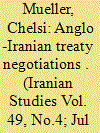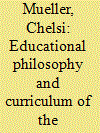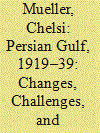| Srl | Item |
| 1 |
ID:
145926


|
|
|
|
|
| Summary/Abstract |
From 1927 to 1932, wide-reaching negotiations took place between Reza Shah's court minister, ‘Abdolhossein Khan Teymurtash, and the British Legation in Tehran, the aim of which was to resolve all outstanding issues and to normalize relations between the two countries on the basis of a general treaty. This article examines these Anglo-Iranian negotiations with a particular focus on the thorniest issues—Iran's territorial claims in the Persian Gulf, particularly its claims to sovereignty over Bahrain, Abu Musa and the two Tunb islands. Though an agreement was never reached, an examination of the content and conduct of these negotiations offers some valuable insights into the unique features of Iranian nationalism and Iranian ambitions in the Persian Gulf during the Reza Shah period.
|
|
|
|
|
|
|
|
|
|
|
|
|
|
|
|
| 2 |
ID:
114159


|
|
|
|
|
| Publication |
2012.
|
| Summary/Abstract |
The educational curriculum produced by the Fatah-led Palestinian Authority (PA) is said to be situated on the intellectual basis of faith in Allah. The curriculum presents Islam as one of three essential components of the Palestinian identity. The place given to Islam in the educational philosophy and curriculum of the PA signifies a departure from the place given to Islam in the PLO's earlier documents and Fatah's earlier discourse; in fact, owing to the elevated position of Islam, the discourse in the curriculum more closely resembles that of the PLO's Islamist opposition, namely Hamas. This article compares the Palestinian identity discourse as it is presented in the PA educational philosophy (1998) and school curriculum (2000-2006) with the identity discourse in the PLO's earlier philosophy of education as well as Hamas' philosophy of education. The explanation for this change in the discourse of the Palestinian nationalist movement takes into account Fatah's bid to maintain legitimacy in a deeply divided society and Hamas' challenge to Fatah in the Palestinian arena as well as the background of the Islamic revival across the greater Muslim world.
|
|
|
|
|
|
|
|
|
|
|
|
|
|
|
|
| 3 |
ID:
164400


|
|
|
|
|
| Summary/Abstract |
The interwar period (1919–39) was a formative period in the Persian Gulf. These years marked a transition from a Gulf society once characterized by symbiosis and interdependency to a sub-region characterized by national divisions, sectarian suspicions, rivalries and political tension. This period witnessed a surge of anti-colonial and nationalist feeling in Iran, the rise of a stridently nationalist military leader in the person of Reza Shah Pahlavi, his implementation of an assertive Persian Gulf policy and his re-assertion of Iran’s claims to coastal territories ruled by Arab shaykhs under British protection. The challenge posed by ascendant Iran to Britain’s dominant position in the Persian Gulf generated an abrupt shift from indirect to direct forms of colonial penetration in the Gulf Arab shaykhdoms and a transfer of Britain’s locus of power from the Iranian to the Arabian littoral. This article surveys the wide-ranging political, economic and social processes that transformed the Persian Gulf community into a sub-region of Arab-Iranian rivalry during the interwar period.
|
|
|
|
|
|
|
|
|
|
|
|
|
|
|
|